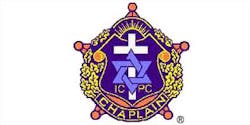Law enforcement is often referred to as a paramilitary organization. Therefore it should come as no surprise many police officers are also in the military; specifically the National Guard.
Officers and soldiers frequently have the same type-A personality and much of the training given our nation's police force and our military forces is very similar.
One particular area where police work in the military and visa versa is in Chaplaincy. Not only do police chaplains serve as military chaplains but you will frequently find police chaplains and law enforcement chaplains working side by side in disaster situations such as hurricanes.
2008 was a hard year for the coast line of our country and one place police and military chaplains worked hand in hand was during Hurricanes Dolly, Gustav, and Ike.
The author, a Chaplain for the Texas Department of Public Safety as well as the Brown County (Texas) Sheriff's Department is also a chaplain for the Military Forces of Texas, Texas State Guard. As a military chaplain he is assigned to the Standing Joint Interagency Task Force - Texas, that serves as command and control over the Texas Governor's military assets dedicated to a given disaster.
During Hurricane Ike CH (CPT) David Fair served side by side with chaplains he also works with in civilian life. Several Texas Department of Public Safety Chaplains as well as various police, sheriff and fire/rescue chaplains worked together during the disasters.
Chaplain Leatha Warden who serves the Brownwood, Texas Police Department says, "the arrangement works well because chaplains who have a dual military and law enforcement role can act as a liaison making it much easier for each group to understand the role of the other."
Military personnel who have retired from law enforcement also like the arrangement. One such soldier is Capt. Robert Spratt of the Texas State Guard who retired and moved to Texas after 30 years with the Washington D.C. Capitol Police. He uses his law enforcement and Marine experience to augment what he does for the military.
Currently there is a nationwide shortage of law enforcement officers mainly due to so many police officers being in the military, called for active duty. This is resulting in law enforcement agencies to increasing salaries, paying sign on bonuses much like the military, and making curtain concessions about where officers can live and still work for a department.
But the shortages work both ways. The military is hundreds of chaplains short to serve the nations military men and women. Stateside some military units are utilizing police chaplains to augment when necessary. Sadly one such job is using police chaplains when military chaplains are unavailable to serve with casualty teams to made family notifications.
All in all both law enforcement administrators and military commanders give high marks to their chaplains working hand in hand.
Dave Fair | Chaplin
Chaplain Dave Fair is a former Board Member of the International Conference of Police Chaplains, where he served as Chair of the Education Committee. He is a Senior Chaplain for the Texas Department of Public Safety, and the Brown County (TX) Sheriff's Department where is also serves as a reserve deputy. He is Chaplain Emeritus of the Brownwood (TX) Police Department. Fair is a member of the Board of Scientific and Professional Advisors of the American Academy of Experts in Traumatic Stress, and has written numerous articles on Chaplaincy and Traumatic Stress. Chaplain Fair is President of the American Association of Police Officers and President and CEO of Homeland Crisis Institute. A licensed peace officer, Chaplain Fair holds a Ph.D. in Pastoral Counseling and Psychology from Bethel Bible College and Seminary, and a doctorate in Clinical Christian Counseling from Central Christian University. Dr. Fair is a member of the Curriculum Committee of the American Board of Certification in Homeland Security, as well as a member of the Commission on Forensic Education.



